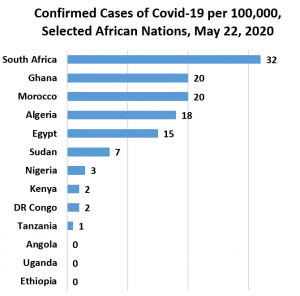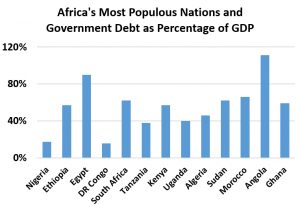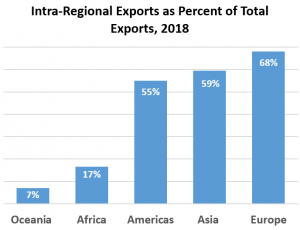Hope For Africa During COVID-19 Pandemic – Analysis
The Covid-19 pandemic, while treacherous for economies, inspires self-reliance and innovation in Africa, particularly around food production.
By Eric Ekobor-Ackah Mochiah*
The mightiest of nations have fallen victim to Covid-19, and many predict problems for less developed nations. Yet Africa may surprise the world in managing this pandemic when the international community cannot step up to help.
Granted, there are challenges and unknowns. Arguing for rapid development of a vaccine, philanthropist Melinda Gates describes the challenges in the developing world, including lack of access to water to practice handwashing, the inability to practice social distancing in dense townships and slums, and the difficulties of imposed lockdowns as people need to work and pick up food on a daily basis. Africa reports more than 100,000 cases in all, with more than 3,000 deaths. Of 54 countries, 12 report more than 2,000 cases – including South Africa, Egypt and Algeria. Gates suggests that low case numbers are linked to lower rates of testing, and researchers question if the disease is less active in places with warmer temperatures. In Africa, some of the nations worst hit have posted relatively lower temperatures. Covid-19’s fatality rate is higher among the elderly, and the median age in Africa is just under 20.

Still, Africa may be resilient – and the case of Ghana debunks suggestions that Africa cannot take care of herself during these trying times. Ghana has recorded more than 6,400 cases with about 30 deaths and 200,000 tests conducted so far. Rural clinics use drones, carrying samples to urban testing centers, reducing delivery time to about 30 minutes rather than hours required by car. The Zipline fleet in Ghana has the capacity to transport 15,000 tests from 300 flights in a day, reports Time, and drone technology speeds identification of the infected and contact tracing while also helping deliver medical supplies.
Ghana also closed its international borders as of mid-March. Kotoka International Airport placed returning citizens and residents under a strict two-week quarantine for observation and testing. The nation’s two major cities imposed a partial lockdown for three weeks to ensure extensive contact tracing and testing. The World Health Organization lauded Ghana for these moves.
Other African nations took similar steps, imposing complete or partial lockdowns as well as contact tracing. Reports suggest the lockdowns increased social interactions among family members and improved daily life. Some African countries followed developed countries in closing their borders indefinitely. Many increase testing, enforce social distancing and require face masks.
Countries also stepped up cooperation – with Rwanda, for example, declaring it could provide medical supplies and ventilators, some supplied by China, for others in need of such critical equipment. South Africa, Rwanda, Senegal and Ghana also report adequate supplies of test kits, again many supplied by China and the Africa Centers for Disease Control and Prevention.

Covid-19 could be more treacherous for Africa’s economy, disrupting trade and financial inflows, as the International Monetary Fund predicts global growth to fall by at least 3 percent this year. For sub-Saharan Africa, the World Bank projects economic growth between -2.1 and -5.1 percent in 2020, depending on success of pandemic mitigation measures. Economies heavily reliant on exports of commodities with drastic price declines, like oil – including Nigeria and Angola – could suffer the most. Likewise, countries that rely on tourism – including Egypt, Morocco and South Africa – can anticipate a decline in revenue.
Covid-19 could add to public debt vulnerabilities. The ratio of general gross debt-to-GDP in sub-Saharan Africa has worsened since 2012 from 37 percent to 59 percent, and there could be more deterioration as domestic production levels and economic activities decline. This coupled with heightened fiscal deficit through huge spending to contain the disease and offset losses may make debt payments difficult.
African governments offer stimulus packages, with South Africa, Ghana and others providing an array of soft loans, tax deferrals, tax assistance and relief for businesses to retain low-income employees. Ghana offered support for private and commercial customers to pay utility bills. Kenya, Ghana and others supply food items for vulnerable populations. In Ghana for example, several companies and institutions have joined in the manufacturing of hand sanitizers, local medicines that boost the immune system and personal protective equipment, or PPE. Masks made in Ghana rely on the colorful local textiles, increasing demand and sustaining jobs in the textile industry.

Africa, pushed to the wall, takes action – even as most countries look inward, helping their own citizens before extending assistance to the rest of the world. Many countries have already announced plans to restrict exports of medical products as well as staple foods. For instance, Russia and Kazakhstan imposed quotas on exports of wheat, sugar, sunflower seeds and some food vegetables such as potatoes. Similarly, Vietnam, India and Cambodia reduced or banned rice exports to ensure local food security. Rice and wheat were the third leading imports for Ghana and Nigeria, respectively, in 2018, and sub-Saharan Africa is the world’s largest region for rice imports, according to the World Bank
The African Development Bank projects the continent’s annual food import bill of $35 billion to rise to $110 billion by 2025, and this would weaken African economies, specifically agricultural and export jobs. Covid-19 could worsen matters, but Africa can control the trajectory. The crisis could offset inelastic tastes for foreign foods and curb preference for imported grains like wheat and rice, with Africa instead developing and marketing local crops. Most locally produced foods – including yams, plantains, cassava, tomatoes, oranges, watermelons, among others – are left to rot with little preservation or value-added processing. If Africans reverse course in this area, there could be both demand-induced supply for most import-substituted foods and supply-induced demand for value-added processing – increasing crop production levels to sustainable levels, reducing dependence on imports while increasing food security. A new independent mindset and the will to increase productive capacities from all factors of production, especially labor, is required.
Crops like maize and rice, which form a substantial proportion of food eaten and grown by Africans, could aid in food security and sustainability as farmers over the years have experimented with seeds that are high yielding and resistant to drought, pest and diseases.
Countries must now focus on buffer stock institutions and smaller, yet valuable food manufacturing companies – many in ruins all over the continent. The reasons are many: low demand from the inelastic taste for foreign products, stiffer competition from foreign brands and, most importantly lack of national agendas. Too often, political parties when they come to power neglect projects undertaken by their opponents to help preserve and store excess food produced in Africa. Such local production would give rise to manufacturing jobs and sustained incomes, encouraging demand for local products.
Africa, with self-reflection and appreciation, could rise above aid and become self-reliant after Covid-19. Only a few short months ago, the world thought of the virus that emerged in China as a distant challenge. Since then, Covid-19 has spread to almost every corner of the world. Each country has the opportunity to take charge of its destiny, handling the problem as they see fit.
If the international community is inclined to help change the fortunes of Africans in a timely manner, that must be done through debt relief. Still, with great food insecurity predicted by the world, Africans and others must rise and take matters into their own hands.
*Eric Ekobor-Ackah Mochiah is a 2019-20 Fox International Fellow at Yale University and a doctoral candidate at the Economics Department of University of Ghana. His PhD project focuses on empirical evidence of Mobile money technology in the light of its impact of on savings, gender dimension of volume of transaction, and willingness to pay for deposit insurance against rising security and safety issues.

